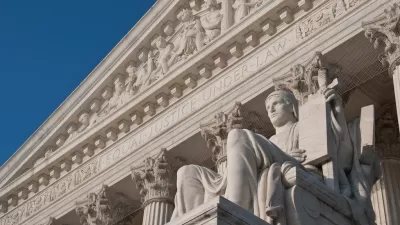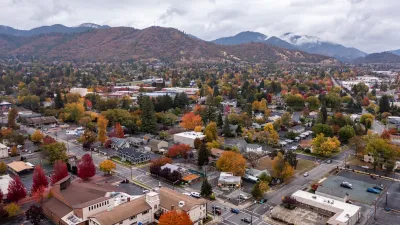The Supreme Court ruled in favor of a private land owner in Wyoming, who sued to reclaim land once granted to a railroad under an 1875 law. The ruling undermines the legality of the nation’s network of public trails built on former rail right-of-way.
Lyle Denniston details the 8-1 ruling in Marvin M. Brandt Revocable Trust v. United States: "At considerable potential cost to the federal government, the Supreme Court ruled Monday that land swapped with, or transferred to private owners under an 1875 law became their property in full again once a railroad that ran across the property has been abandoned. The decision turned mainly upon an argument that the government had made to the Court seventy-two years ago and won — an argument that now was turned against it." The 1942 case that enabled this week's ruling was Great Northern Railway Co. v. United States.
According to Denniston, it's still unclear just how much land the ruling will impact: "It is unclear just how many acres (primarily in western states) will be covered by the new ruling, although the Justice Department had told the Court that the case involved the legality of 'thousands of miles of former rights-of-way' that the public now uses as recreational trails or park lands."
In a separate article, Jess Bavin addresses the impact of the ruling on efforts around the country to convert former rail rights-of-way into public trails. Bavin quotes Justice Sonia Sotomayor, the lone dissenting member of the court, who makes the point of how expensive a decision this might represent: "The Court undermines the legality of thousands of former rights of way that the public now enjoys as means of transportation and recreation...And lawsuits challenging the conversion of former rails to recreational trails alone may well cost American taxpayers hundreds of millions of dollars."
FULL STORY: Opinion analysis: Victory — and money — for landowners

Planetizen Federal Action Tracker
A weekly monitor of how Trump’s orders and actions are impacting planners and planning in America.

Maui's Vacation Rental Debate Turns Ugly
Verbal attacks, misinformation campaigns and fistfights plague a high-stakes debate to convert thousands of vacation rentals into long-term housing.

San Francisco Suspends Traffic Calming Amidst Record Deaths
Citing “a challenging fiscal landscape,” the city will cease the program on the heels of 42 traffic deaths, including 24 pedestrians.

Amtrak Rolls Out New Orleans to Alabama “Mardi Gras” Train
The new service will operate morning and evening departures between Mobile and New Orleans.

The Subversive Car-Free Guide to Trump's Great American Road Trip
Car-free ways to access Chicagoland’s best tourist attractions.

San Antonio and Austin are Fusing Into one Massive Megaregion
The region spanning the two central Texas cities is growing fast, posing challenges for local infrastructure and water supplies.
Urban Design for Planners 1: Software Tools
This six-course series explores essential urban design concepts using open source software and equips planners with the tools they need to participate fully in the urban design process.
Planning for Universal Design
Learn the tools for implementing Universal Design in planning regulations.
Heyer Gruel & Associates PA
JM Goldson LLC
Custer County Colorado
City of Camden Redevelopment Agency
City of Astoria
Transportation Research & Education Center (TREC) at Portland State University
Jefferson Parish Government
Camden Redevelopment Agency
City of Claremont





























